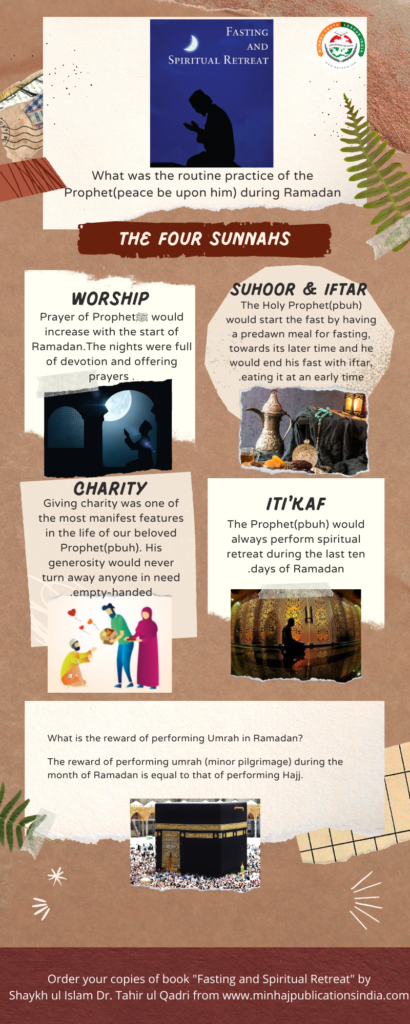What was the routine practice of the Prophetﷺ during Ramadan?
A: During the blessed month of Ramadan, the acts of worship and spiritual striving would increase a great deal as compared to other days. Awe of the Divine Presence and aspiration to the Divine Court, would rise to a climax and the hours of worship at night would increase. The study of the biography of the holy Prophetﷺ guides us to the following main points.
Great worship and Austerity
Mother of the Believers, Hadrat Aisha(RA) reports: ‘The face of Allah’s Messengerﷺ would change colour (out of awe for Allah) and his prayer would increase with the start of Ramadan. He would beseech Allah humbly and earnestly and fear him.’►[Narrated by al-Bayhaqi in Shuab al-Iman, 3:310 §3625]
Pre-dawn meal for fasting and fast-breaking
The Holy Prophetﷺ would start the fast by having a predawn meal for fasting, towards its later time and he would end his fast with iftar, eating it at an early time. Hadrat Anas(RA) reported the word of the Prophetﷺ as follows:‘Eat pre-dawn meal for fasting, there is blessing in it.’►[Narrated by Muslim in al-Sahih, 2:770 §1095]
Abu Qays reported that Amr b. al-Aas(RA) narrated the words of the Prophetﷺ as follows: ‘The difference between our fast and that of the People of the Book is that of eating pre-dawn meal for fasting.’►[Narrated by Muslim in al-Sahih, 2:771 §1096.]
Night Prayer
The Ramadan nights of the Prophetﷺ were full of devotion, offering prayer, glorifying Allah, reciting the Quran and keeping His remembrance. The collective form of prayer known as tarawih is a portion of it. The holy Prophetﷺ expressed the importance of occupying the nights of Ramadan with worship in the following words:
‘Whoever fasts the days of Ramadan and prays at its nights with faith and intention of reward, becomes purified of all sins [he is sinless] like the day he was born.’►[Narrated by al-Nasai in al-Sunan, 4:158 §2208–2210.]

Abundance of charitable deeds
Giving charity was one of the most manifest features in the life of our beloved Prophetﷺ. His generosity would never turn away anyone in need empty-handed. This generosity would increase remarkably during Ramadan as compared to the other eleven months. His natural magnanimity and princely open-handedness would grow
beyond all bounds of benevolence. Hadrat Abd Allah b. Abbas (RA) narrates: When Jibril used to visit, the Prophetﷺ became more generous than the blowing winds.”►[Narrated by al-Bukhari in al-Sahih, 2:672–673 §1803]
Hadrat Jibril(AS)’s arrival would always be a message of Allah’s love and affection. Since these visits used to increase in Ramadan far more than ordinary days, the Prophetﷺ would also increase his charitable spending to celebrate this advent of spiritual quickening. Imam al-Nawawi deduces a number of points from this hadith, some of which we mention here.
1. The generosity of the Prophetﷺ
2. The desirability of great acts of charity during Ramadan
3. Increasing the acts of charity at a righteous person’s visit
4. Permissibility of establishing schools for teaching the Quran.►[Nawawi, Sharh Sahih Muslim, 15:69]
Spiritual Retreat (al-Itikaf)
The Prophetﷺ would always perform spiritual retreat during the last ten days of Ramadan. Mother of the Believers, Hadrat Ayesha(RA) reports:
‘The Prophetﷺ used to perform spiritual retreat during the last ten days of Ramadan until heﷺ met Allah. His wives continued to perform the spiritual retreat after himﷺ.’►[Narrated by al-Bukhari in al-Sahih, 2:713 §1922]
What is the reward of performing Umrah in Ramadan?
Answer:
The reward of performing umrah (minor pilgrimage) during the month of Ramadan is equal to that of performing Hajj.
Ibn Abbas(RA) reported that the Prophetﷺ asked an Ansari woman why she had not performed Hajj with himﷺ. She said that her family had two camels to fetch water. Her husband and her son travelled to Mecca on one and performed Hajj. They left the other one for the family’s needs. [So, she did not have the means to go herself.] The Prophetﷺ responded: ‘When Ramadan arrives, go and perform umrah for umrah in Ramadan is like a Hajj.’►[Narrated by al-Bukhari in al-Sahih, 2:631 §1690.]
– For further reading , please order your copies of book “Fasting and Spiritual Retreat” by Shaykh ul Islam Dr. Tahir ul Qadri from www.minhajpublicationsindia.com


